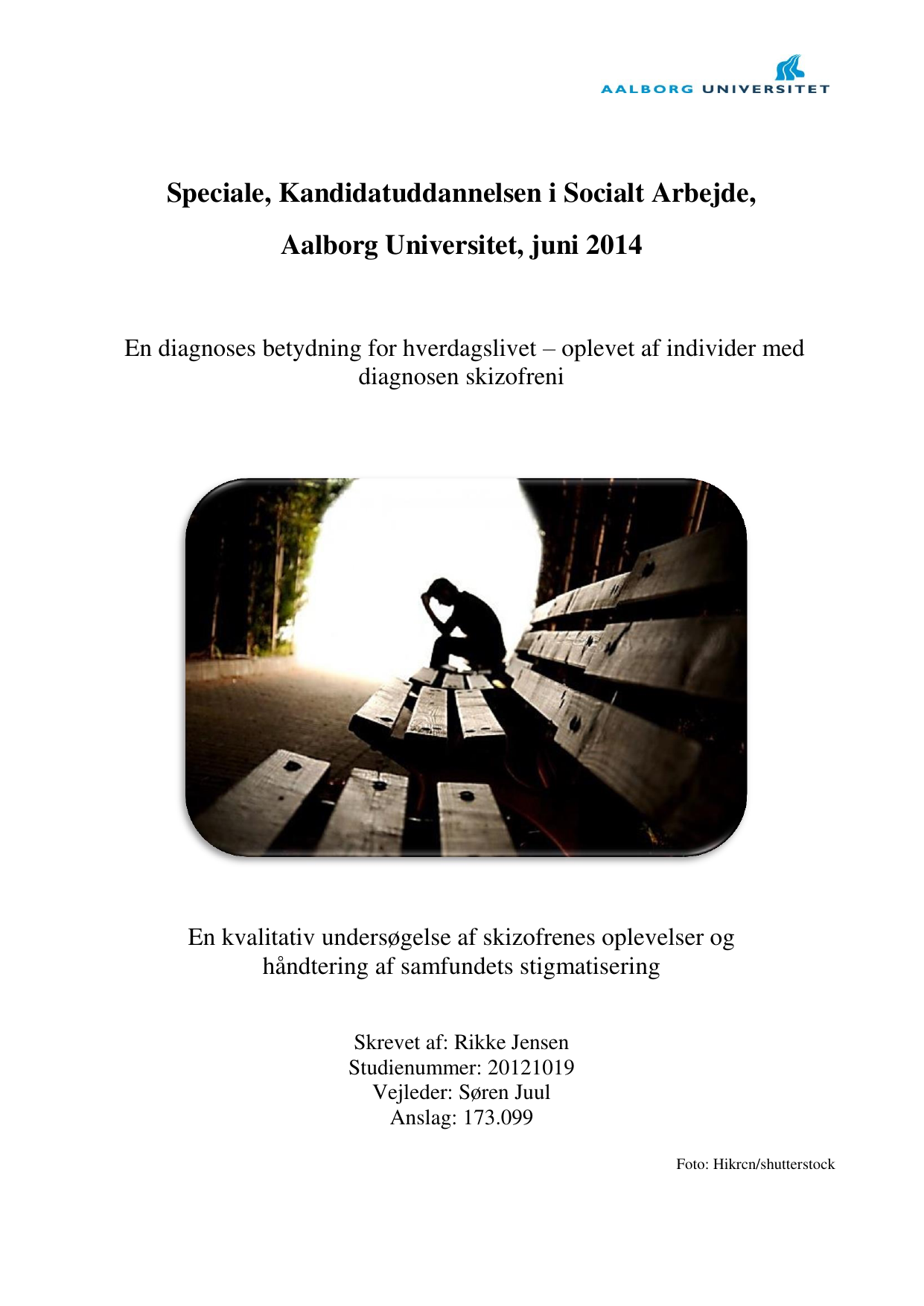
En diagnoses betydning for hverdagslivet - oplevet af individer med diagnosen skizofreni : En kvalitativ undersøgelse af skizofrenes oplevelser og håndtering af samfundets stigmatisering
Oversat titel
A diagnosis implication to the everyday life - experienced by individuals with the diagnosis schizophrenia: A qualitative study of schizophrenic´s experiences and handling of the society´s stigmatization
Forfatter
Semester
4. semester
Uddannelse
Udgivelsesår
2014
Afleveret
2014-06-01
Antal sider
83
Abstract
Dette speciale fokuserer på samfundets stigmatisering af skizofrene og hvilke konsekvenser dette kan have for deres recovery-proces. Målet med dette speciale er, at undersøge skizofrenes oplevelser og håndtering af samfundets stigmatisering og hvilke konsekvenser dette kan have for deres recovery-proces. Dette speciale er baseret på en fænomenologisk/hermeneutisk tilgang og en empirisk dataindsamling bestående af kvalitative semitstrukturende livsverdensinterviews med fem skizofrene. I specialets analyse bliver den indsamlede empiri konfronteret med en teoretisk ramme bestående af Erving Goffmans stigmatiseringsteori, Howard S. Beckers Stemplingsteori og Alain Topors recovery-teori. Undersøgelsen viste, at skizofrene bruger meget tid, energi og ressourcer på at skjule deres skizofreni for samfundet. De skizofrene kan vælge, at anvende betegnelsen psykisk syg istedet for skizofren, men dette kan resultere i, at de kan få svært ved, at danne et fuldstændigt billede af dem selv. Det viste sig, at de kunne udtænke kriminelle planer eller anvende kriminelle metoder og dette kan ende med, at de vil fjerne sig mere og mere fra hvad der er normalt i samfundet og i sidste ende kunne de ende i fængsel. At søge tilbage til psykiatrisk afdeling er ligeledes en måde skizofrene kan håndtere samfundets stigmatisering på, men en indlæggelse vil afskærme dem for resten af samfundet. Når skizofrene er blevet udskrevet fra psykiatrisk afdeling kan de blive udsat for stigmatisering af samfundet, fordi de kan bære på et stempel, "ikke rigtig klog". På baggrund af dette ville den bedste løsning for nogle skizofrene være, at starte på en ny et andet sted, men ikke alle har energi eller ressourcer til dette og derfor kan de risikere tilbagefald. Nogle skizofrene kan opleve at få en ambivalent følelse, når de er sammen med andre psykisk lidende, fordi de ikke vil tænke om dem selv på denne måde. Men det kan have en stor betydning, at kunne se deres erfaringer og oplevelser under deres sygdomsforløb som en del af deres livshistorie. Specialets overordnede konklusion er, at samfundets stigmatisering har konsekvenser for skizofrenes recovery-proces, da samfundets stigmatisering er medvirkende til, at skizofrene ikke kan opnå en vellykket recovery-proces.
This thesis takes focus on the society’s stigmatization of schizophrenics and which consequences this stigmatization can have on their recovery-process. In the light of the limited perspectives in existing research on which consequences the society’s stigmatization can have on schizophrenic’s recovery-process, the aim is to examine how schizophrenics experience and handle the society’s stigmatization and which consequences this could have on schizophrenic’s recovery-process. The thesis is based on a phenomenological/ hermeneutical approach as well as empirical material resulting from qualitative, semi-structured life-world-interviews with five schizophrenics. In the analysis, the empirical material is confronted with a theoretical framework, constituted by Erving Goffman’s theory of stigmatization, Howard S. Becker´s theory of labelling and Alain Topor´s theory of recovery. The present study shows that the interviewed schizophrenics use a lot of time, energy and resources to hide the schizophrenia for the society. The schizophrenics can choose to apply the description, ”mentally ill” instead of schizophrenic, but by doing so, it can make it difficult for them to shape a complete image of them self. It showed that they could conceive criminals plans or make use of criminals methods and this would remove them self, further away from what is normal in the society and in the end, they could end up in jail. To seek back to the psychiatric ward is also a way for the schizophrenics to handle the society’s stigmatization, but a hospitalization will shield them from the rest of the society. The schizophrenics can, when they are released from the psychiatric ward, experience stigmatization because they can carry a label that say ”nuts”. On behalf of this, some schizophrenics would like to make a fresh start somewhere else, but not everyone have the amount of energy to do that and can therefore experience relapse. Some schizophrenics can get an ambivalent feeling by spending time with other mentally ill people and can therefore with conscious, avoid spending time with other mentally ill persons because they don’t want to think of themselves as mentally ill persons. But it can have a significant meaning to see their experiences during their period of sickness, to include that in their life-experience. This thesis’ executive conclusion is that the society’s stigmatization of schizophrenics, have consequences on their recovery-process and the social work should always keep in mind that stigmatization and recovery doesn’t go hand in hand and therefore the precondition for schizophrenics to accomplish a successful recovery-process, is to eliminate the stigmatization of schizophrenics.
Emneord
